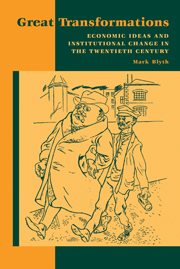1 - Karl Polanyi and Institutional Change
Published online by Cambridge University Press: 05 June 2012
Summary
In retrospect our age will be credited with having seen the end of the self-regulating market.… Hundreds of millions had been afflicted by the scourge of inflation … stabilization of currencies became the focal point of the political thought of peoples and governments. The repayment of foreign loans and the return to stable currencies were recognized as the touchstones of rationality in politics; and no private suffering, no infringement of national sovereignty, was deemed too great a sacrifice for the recovery of monetary integrity.
Karl Polanyi, The Great Transformation: The Political and Economic Origins of Our Time (Boston: Beacon Press, 1944).While Polanyi's description of the economic disorder caused by the self-regulating market still has great resonance, his prediction of that same market's denouement seems precipitous, at least with the benefit of hindsight. For at the onset of the twenty-first century, we find that stable currencies, the fight against inflation, and the unfettered mobility of capital have once again come to be seen as “the touchstones of rationality in politics” throughout the world. Yet Polanyi's analysis contains within it an insight that is still of great value: his concept of the “double movement” as the motor of institutional change.
Polanyi argued, contrary to conventional economic wisdom, that markets were neither neutral in their distributionary effects nor natural in their origins. In particular, Polanyi saw labor as “embedded” in a series of quite “natural” social relationships that made the construction of market institutions and impersonal exchange extremely difficult.
- Type
- Chapter
- Information
- Great TransformationsEconomic Ideas and Institutional Change in the Twentieth Century, pp. 3 - 16Publisher: Cambridge University PressPrint publication year: 2002



